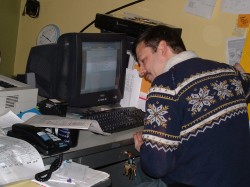![]()
Contact:
(JavaScript must be enabled to view this email address), KRFP News Director
![]()
- Aug. 25: The Value of Rural News
- Jun. 19: CNN’s iReport Sees Iran Growth
- May. 25: ProPublica calls upon CitJ’s
In Idaho, Radio Powered by Citizen Journalism
The Idea:
When community-supported KRFP went on the air in October 2004, organizers wanted the fledgling radio station in Moscow, Idaho, to emphasize local news coverage and produce an evening newscast. With no budget for a reporting staff, the station instead opened its airwaves to citizen journalists.
“So far, it’s working,” said Leigh Robartes, a former Northwest Public Radio reporter who serves as the station’s news director. “As far as producing the show on a daily basis, getting it on the air, and getting news stories collected, we’re doing it. Now, we’re always looking for new people.”

Leigh Robartes, news director for KRFP Radio Free Moscow in Moscow, Idaho, on the effort to produce daily local newscasts using primarily volunteer citizen journalists: “So far, it’s working.”
While the station has eight to 10 regular citizen contributors to the news program, Robartes said only two volunteer producers were working with him on a regular basis in fall 2006. That number was expected to grow to four in spring 2007, but the station remained focused on trying to grow its number of citizen correspondents.
The Training:
Journalism lessons can take as little as 30 minutes at the KRFP studio, where Robartes said his goal is to get citizen journalists into the field to learn by doing.
“We try to get people moving on things fairly quickly,” said Robartes, who walks new citizen recruits through the basics of sound recording and the issues of the day before sending them on assignments. “If somebody’s a quick learner, I’ll just teach them how to use the mini disc recorder, tell them a little bit about mic placement and give them an idea of the issue.”
Back in the studio, Robartes works one-on-one with the volunteer journalists to help them write scripts, edit sound and get their pieces on the air.
“I think we’re being a little more informal and a little less academic,” than other citizen journalism programs, he said. “We’re willing to take the risk of letting people go out in the field and do some reporting. I think there is a motivation to just get the facts to people.”
The Recruits:
Radio Free Moscow has trained about 20 people as citizen journalists over the past two years, some with the help of a J-Lab New Voices grant. Of those, about half contribute stories on a regular basis. Many of the recruits already had a connection to the station, volunteering as deejays before they reported, for instance, or working as college interns in the news department.
Others are individuals who are active in the community and see their work with the radio station as a way to ensure local issues get covered.
“They may not have the time to do this all the time, but they’re willing to spend an evening once a month, or a couple times a month, recording something because they know they aren’t going to get the full story from the daily paper or certain aspects of the story wont come through,” Robartes said. “Sometimes we cover things, and we’re the only people covering them.”
The Results:
Citizen journalists have produced stories on everything from politics to land use issues to extensive coverage of local zoning issues. Stories included in the KRFP evening newscast refer to the correspondents as citizen journalists.
KRFP news stories produced in 2006 are archived here.
PREV: Training Citizen Journalists
NEXT: In Kansas, Opening the Newsroom Doors to Citizen Journalists





Comments
Be the first to leave a comment on this page!